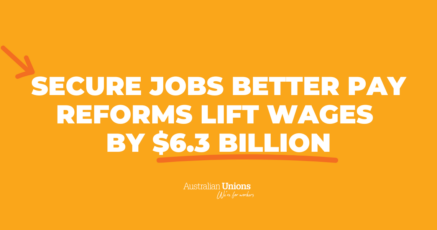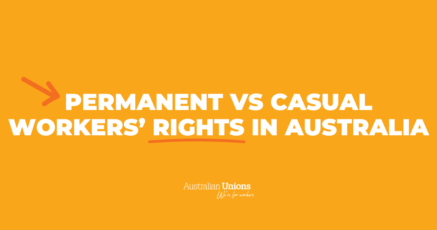For the International Day Against LGBTQIA + Discrimination this year, we want to highlight an important win for intersex workers that is cause for celebration.
As of December 2022, people with intersex status are better protected from discrimination in the workplace thanks to powerful unions and community organisation campaigning.
How intersex discrimination starts in childhood
If this is your first time encountering the term ‘intersex’, then keep reading. Otherwise, you can jump down to find out more about the new protections at work.
Content warning: non-consensual surgery
Intersex people have innate sex characteristics that don’t fit medical and social norms for female or male bodies. Sex characteristics are physical features relating to sex – including chromosomes, gonads, genitals, hormones, reproductive anatomy and secondary features that emerge from puberty. These variations in sex characteristics are also referred to as ‘intersex’ traits.
‘Intersex’ is an umbrella term: there is a huge diversity among people who are intersex. ‘Intersex traits’ includes a wide range of at least 40 different underlying variations which can be determined prenatally, at birth, during puberty, and at other times, such as when trying to conceive a child. It’s important to note that not everyone with any of these traits will use ‘intersex’ to describe themselves.
Despite intersex traits being an entirely natural part of human variation, such traits are pathologised and often labelled as medically ‘abnormal’, meaning intersex infants and children are at a significant risk of non-consensual and irreversible ‘normalising’ medical interventions early in childhood. Such surgeries are not necessary for health reasons, but are designed to make people with intersex variations appear more typically female or male, and can often cause substantial harm, and trauma, including having negative effects on sexual function, sensation and fertility.
Many intersex people suffer lifelong physical and emotional effects from such interventions, and related trauma, shame and secrecy. The UN and many other human rights institutions recognise such interventions as harmful practices and forms of violence and ill treatment.
Despite decades of advocacy from intersex rights groups to end non-consensual surgeries, within Australia, the ACT is the only state or territory to introduce draft law protecting intersex children from this surgery until they’re old enough to give informed consent.
Intersex discrimination continues into adulthood whether that be through body shaming and stigmatisation in education, healthcare, sport, work and other settings, excluding intersex people from important data collection, or expecting someone to automatically disclose their intersex status.
After huge union and community-led changes to work rights in Australia, we are one step closer to ending that discrimination.
Changes to workplace discrimination for people with intersex status
There have been laws against workplace discrimination in Australia for some time now. Whilst the Sex Discrimination Act has protected people from discrimination on the basis of intersex status since 2013, prior to 7 December 2022 the Fair Work Act previously excluded intersex people from protection against discrimination.
That means you cannot be discriminated against based on your intersex status. Nor can your employer treat you adversely – such as ending your employment – based on your intersex status. Intersex workers are now able to bring general protections complaints in the Fair Work Commission, which may be cheaper and more accessible than seeking remedies under the Sex Discrimination Act.
Modern awards and enterprise agreements will also not be able to discriminate against workers based on intersex status, and the Fair Work Commission will need to take into account the need to prevent and eliminate discrimination on the basis of intersex status while performing its functions and exercising its powers. This will lead to better protection from discrimination in the workplace, and improve economic and job security for intersex workers.
If you are facing discrimination, or know someone else who is, contact your union. They can help you make a complaint to the Fair Work Commission for unfair treatment.
The best form of protection at work is a union. That’s because union members stand up for each and make changes to benefit everyone.
Photo by Sinitta Leunen on Unsplash






SHARE:
Intersex employees better protected at work